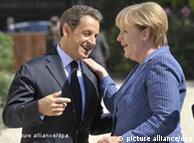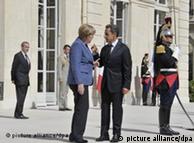EUROPE | 16.08.2011
Germany and France push for closer economic coordination in the eurozone
German Chancellor Angela Merkel and French President Nicolas Sarkozy have called on all 17 eurozone nations to be more responsible in managing their budgets in order to reduce the common debt.
After joint talks in Paris, Sarkozy said he and Merkel proposed that all eurozone member states should commit to balanced finances and enshrine that goal in their constitutions.
Among other measures, Sarkozy announced that France and Germany would seek to ensure better cross-border coordination via twice-yearly meetings, and advocate the creation of a two-and-a-half-year presidency to steer that forum. European Council President Herman Van Rompuy should be the first person to hold the post.
The leaders emphasized that all eurozone member states would have to work together to improve economic governance.
"We want to express our absolute will to defend the euro and assume Germany and France's particular responsibilities in Europe and to have on all of these subjects a complete unity of views," Sarkozy said.
Next month, the two countries are planning to urge their European Union partners to adopt a tax on financial transactions, Sarkozy announced.
"The German and French finance ministers will put a joint proposition for a tax on financial transactions on the table of European institutions from next month, September," Sarkozy told reporters.
Investor anxiety
The talks came amid mounting fears that the eurozone could be sliding back towards recession, with statistics released Tuesday showing that Germany, Europe's biggest economy, grew only 0.1 per cent in the second quarter.
The figures caused further dismay, days after France's economy was shown to have stopped growing altogether in the second quarter.
The two leaders have been under pressure to come up with plans to shore up the eurozone and restore financial market confidence after a year and a half of turmoil that has refused to die down despite bailouts of Greece, Ireland and Portugal and the creation of an anti-contagion fund.
Tuesday's meeting took on added significance after markets went into a tailspin last week over concerns about rising borrowing costs for Italy and Spain, a downgrade of the United States' credit rating and speculation that France could be the next to lose its AAA rating.
The tumult, which forced the European Central Bank to intervene by buying up Spanish and Italian bonds, has led to calls for greater economic integration in the eurozone, with stronger economies shielding the weak.
Across Europe, support is growing for the creation of eurobonds, which would see countries with the euro effectively guarantee each other's debt.
Eurobonds were, however, not up for discussion at the summit on Tuesday, although Berlin is said to oppose such a move.
"I don't think the eurobonds would help us today," Merkel said, when prompted by reporters.
Author: Joanna Impey (AFP, AP, dpa, Reuters)
Editor:Susan Houlton
Editor:Susan Houlton
dw



No comments:
Post a Comment